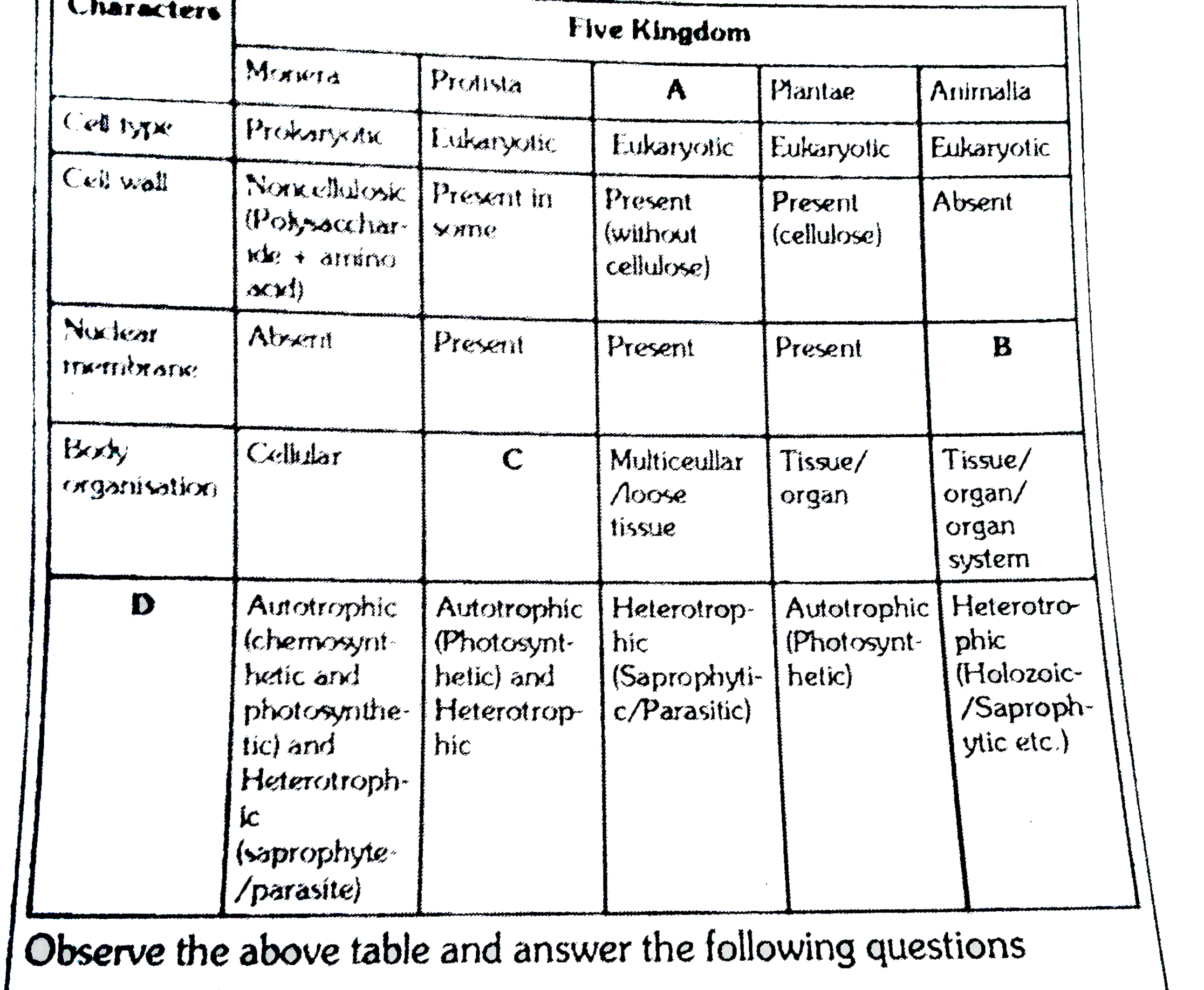According to R.H. Whittaker in which kingdom included producer, decomposer and consumer:-
Plantae
Fungi
Protista
Animalia
The correct Answer is:C
Step-by-Step Solution:
1. Understanding R.H. Whittaker's Classification: R.H. Whittaker proposed a five-kingdom classification system which includes the kingdoms: Monera, Protista, Fungi, Plantae, and Animalia.
2. Identifying Producers, Decomposers, and Consumers:
- Producers: Organisms that can produce their own food, usually through photosynthesis (e.g., plants).
- Decomposers: Organisms that break down dead and decaying organic matter to obtain nutrients (e.g., fungi and certain bacteria).
- Consumers: Organisms that cannot produce their own food and must consume other organisms for energy (e.g., animals).
3. Analyzing Each Kingdom:
- Monera: Includes prokaryotic organisms (bacteria) that can be autotrophic (producers) or heterotrophic (consumers).
- Protista: This kingdom includes unicellular eukaryotes. It contains:
- Producers like diatoms and golden algae.
- Decomposers like slime molds.
- Consumers like protozoans.
- Fungi: Primarily heterotrophic (decomposers) and do not have autotrophic members.
- Plantae: Mostly autotrophic (producers) and do not include decomposers or consumers.
- Animalia: Primarily heterotrophic (consumers) and does not include producers or decomposers.
4. Conclusion: The kingdom that includes producers, decomposers, and consumers is Kingdom Protista.
5. Final Answer: According to R.H. Whittaker, the kingdom that includes producers, decomposers, and consumers is Kingdom Protista.
---
- Producers: Organisms that can produce their own food, usually through photosynthesis (e.g., plants).
- Decomposers: Organisms that break down dead and decaying organic matter to obtain nutrients (e.g., fungi and certain bacteria).
- Consumers: Organisms that cannot produce their own food and must consume other organisms for energy (e.g., animals).
- Monera: Includes prokaryotic organisms (bacteria) that can be autotrophic (producers) or heterotrophic (consumers).
- Protista: This kingdom includes unicellular eukaryotes. It contains:
- Producers like diatoms and golden algae.
- Decomposers like slime molds.
- Consumers like protozoans.
- Fungi: Primarily heterotrophic (decomposers) and do not have autotrophic members.
- Plantae: Mostly autotrophic (producers) and do not include decomposers or consumers.
- Animalia: Primarily heterotrophic (consumers) and does not include producers or decomposers.
Topper's Solved these Questions
- DIVERSITY IN LIVING WORLD (PLANT DIVERSITY)BOOK - ALLENCHAPTER - DIVERSITY IN LIVING WORLD (PLANT DIVERSITY)EXERCISE - BEGINNER S BOX-3
13 Videos
- DIVERSITY IN LIVING WORLD (PLANT DIVERSITY)BOOK - ALLENCHAPTER - DIVERSITY IN LIVING WORLD (PLANT DIVERSITY)EXERCISE - BEGINNER S BOX-4
13 Videos
- DIVERSITY IN LIVING WORLD (PLANT DIVERSITY)BOOK - ALLENCHAPTER - DIVERSITY IN LIVING WORLD (PLANT DIVERSITY)EXERCISE - Assertions and Reason
45 Videos
- DIGESTION AND ABSORPTIONBOOK - ALLENCHAPTER - DIGESTION AND ABSORPTIONEXERCISE - S
28 Videos
- DOMESTICATION OF PLANT (PLANT BREEDING)BOOK - ALLENCHAPTER - DOMESTICATION OF PLANT (PLANT BREEDING)EXERCISE - S
28 Videos
Similar Questions
According to Whittaker kingdom monera includes :-
View SolutionIn Whittaker's classification, which kingdom is main producer ?
View SolutionTo which kingdom of Whittaker, producers belong ?
View SolutionWhich group includes decomposers?
View Solution
Q. How many kingdoms include producers and name these kingdoms?
View SolutionAccording to R.H. Whittaker's five - kingdom classification , how many of the following are placed in Kingdom Protista ?
Chlorella , Riccia, Pisum , chlamydomonas, cycas, pteridium , Capsella , Gonyaulax , Euglena Amoeba , physarum , Fucus chara .
View SolutionIn which kingdom, all prokaryotic organism are included ?
View SolutionAccording to five kingdom classification protista includes:-
View SolutionWhittaker's five kingdom classification do not include
View SolutionThe type of food chain in which the energy rich organic matter produced by producers is decomposed by microbes and converted into energy rich compounds is called :
View Solution
